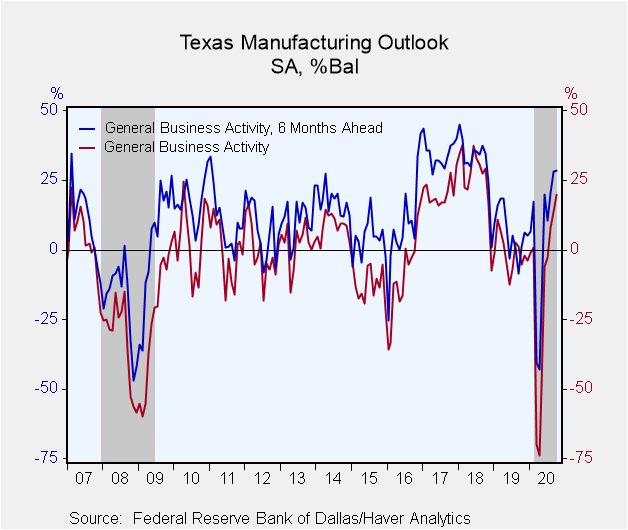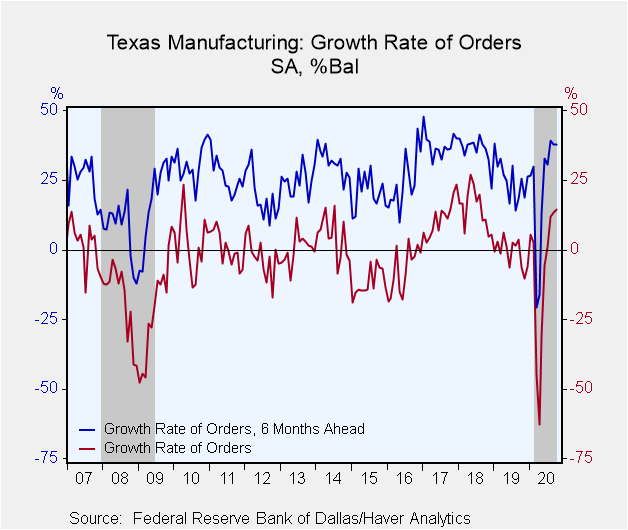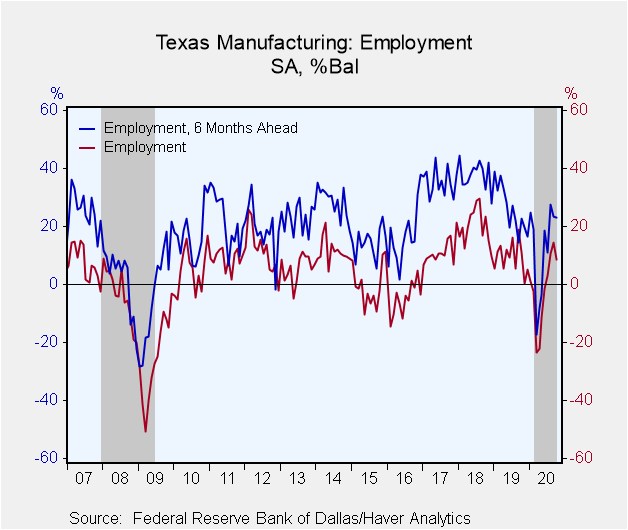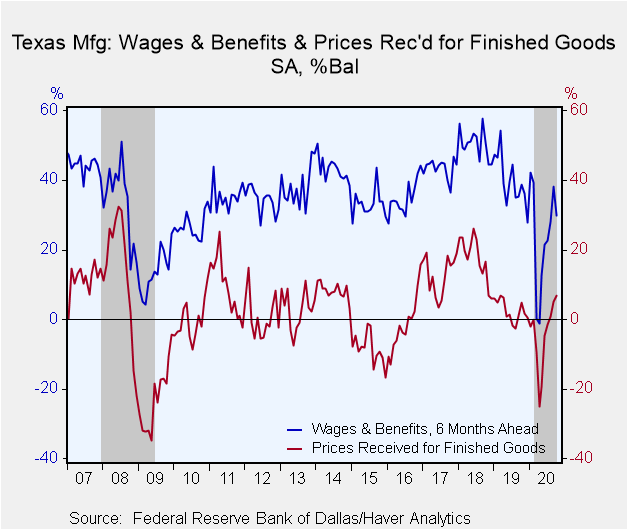 Global| Oct 26 2020
Global| Oct 26 2020Texas Factory Sector Outlook Continues to Improve
Summary
• Texas Manufacturing Outlook survey rose to a 19.8% balance; third consecutive positive reading. • Expectations measure edges up. The Federal Reserve Bank of Dallas Texas Manufacturing Outlook Survey General Business Activity Index [...]
• Texas Manufacturing Outlook survey rose to a 19.8% balance; third consecutive positive reading.
• Expectations measure edges up.
The Federal Reserve Bank of Dallas Texas Manufacturing Outlook Survey General Business Activity Index increased to a 19.8% balance in October from 13.6% in September. This measure hit a record low -74.0% in April (data goes back to June 2004) and has been in positive territory for three months, though remains well below the previous cyclical peak of 37.6% in February 2018.
The production and new orders measures improved 3.2 and 5.2 percentage points (ppt) respectively, while growth in new orders gained 1.1 ppt. Meanwhile, the employment index fell 5.8 ppt, though still remains in positive territory. Pricing power improved 1.6 ppt to a still-low 6.8% balance.
The index of expected business conditions in six months increased to 28.4% in October from 28.0%. Expectations for production declined 0.6 ppt while new orders fell 11.1 ppt. However, the growth in new orders edged up 0.3 ppt.
Each index is calculated by subtracting the percentage reporting a decrease from the percentage reporting an increase. When all firms report rising activity, an index will register 100. An index will register -100 when all firms report a decrease. An index will be zero when the number of firms reporting an increase or decrease is equal. Items October not add up to 100% because of rounding. Data for the Texas Manufacturing Outlook can be found in Haver's SURVEYS database.
| Texas Manufacturing Outlook Survey (SA, % Balance) | Oct | Sep | Aug | Oct '19 | 2019 | 2018 | 2017 |
|---|---|---|---|---|---|---|---|
| Current General Business Activity Index | 19.8 | 13.6 | 8.0 | -5.4 | -1.1 | 25.8 | 20.6 |
| Production | 25.5 | 22.3 | 13.1 | 4.4 | 8.9 | 21.4 | 20.2 |
| Growth Rate of New Orders | 14.3 | 13.2 | 11.8 | -6.4 | -1.1 | 14.8 | 11.4 |
| Employment | 8.7 | 14.5 | 10.6 | 11.0 | 9.5 | 20.0 | 11.4 |
| Wages & Benefits | 16.5 | 15.9 | 15.2 | 21.0 | 23.5 | 29.7 | 22.2 |
| Prices Received for Finished Goods | 6.8 | 5.2 | 0.9 | 4.7 | 2.5 | 17.6 | 12.7 |
| General Business Activity Index Expected in Six Months | 28.4 | 28.0 | 20.4 | 1.1 | 6.4 | 31.6 | 34.6 |
| Production | 47.2 | 47.8 | 43.0 | 29.3 | 35.6 | 48.6 | 46.9 |
| Growth Rate of New Orders | 37.9 | 37.6 | 39.2 | 25.7 | 25.2 | 35.8 | 37.7 |
| Employment | 23.1 | 23.3 | 27.6 | 22.7 | 26.1 | 37.7 | 35.3 |
| Wages & Benefits | 29.9 | 38.1 | 28.1 | 38.8 | 39.7 | 50.4 | 43.4 |
Gerald D. Cohen
AuthorMore in Author Profile »Gerald Cohen provides strategic vision and leadership of the translational economic research and policy initiatives at the Kenan Institute of Private Enterprise.
He has worked in both the public and private sectors focusing on the intersection between financial markets and economic fundamentals. He was a Senior Economist at Haver Analytics from January 2019 to February 2021. During the Obama Administration Gerald was Deputy Assistant Secretary for Macroeconomic Analysis at the U.S. Department of Treasury where he helped formulate and evaluate the impact of policy proposals on the U.S. economy. Prior to Treasury, he co-managed a global macro fund at Ziff Brothers Investments.
Gerald holds a bachelor’s of science from the Massachusetts Institute of Technology and a Ph.D. in Economics from Harvard University and is a contributing author to 30-Second Money as well as a co-author of Political Cycles and the Macroeconomy.
More Economy in Brief
 Global| Feb 05 2026
Global| Feb 05 2026Charts of the Week: Balanced Policy, Resilient Data and AI Narratives
by:Andrew Cates









